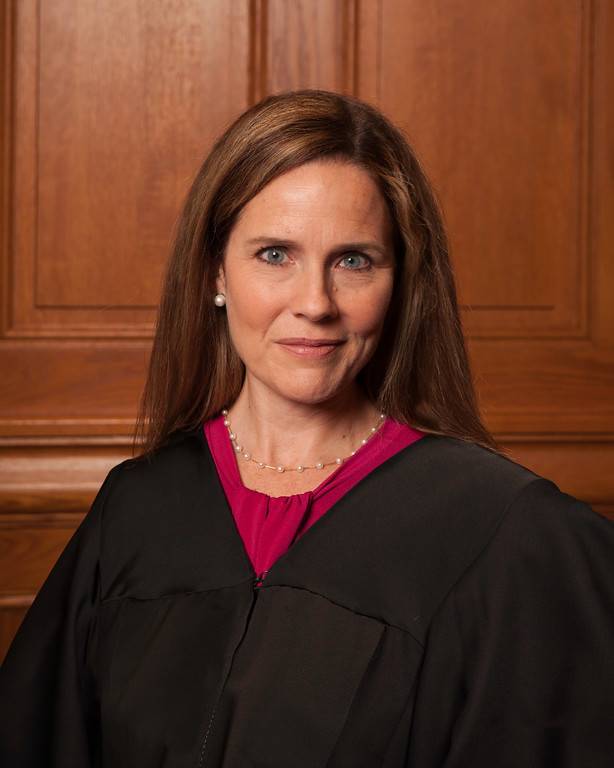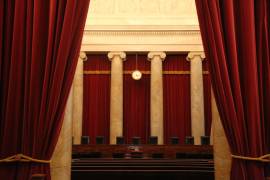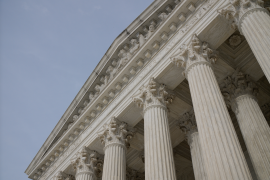News outlets have reported that that President Trump intends to nominate Judge Amy Coney Barrett, currently on the U.S. Court of Appeals for the Seventh Circuit, to the United States Supreme Court to fill the vacancy left by the death of Justice Ruth Bader Ginsburg. Lambda Legal CEO strongly opposes judge Barrett’s nomination and denouncing the rushed confirmation process proposed by U.S. Senate Republicans:
The Supreme Court of the United States, the court of last resort for those seeking justice in our country, should not be up for a power grab. We are a democracy, and this unprecedented attempt to confirm a nominee with an election already underway is undemocratic and indefensible.
It is impossible to overstate how much is at stake, not only for LGBTQ people and everyone living with HIV, but for our entire country.
If confirmed, Judge Amy Coney Barrett will unleash a Supreme Court majority that is hostile to all of our basic civil rights, and the impact will be felt for decades. Judge Barrett’s personal belief that marriage is between a man and a woman, coupled with her unwillingness to affirm that the Supreme Court’s decision making marriage equality the law of the land is settled law, should sound the alarm for anyone who cares about LGBTQ people and their families. However, her cramped so-called “originalist” view of the Constitution threatens the civil rights of not just LGBTQ people but a host of others, including women and people of color, who have relied on the courts to make progress in the fight for equality and justice.
The fight for this Supreme Court seat is about the fundamental rights that shape our lives. We are in the midst of an election that could reroute the course of our nation’s history. For that reason alone, we oppose the confirmation of any Supreme Court justice until that process has run its course. But on the merits alone, regardless of timing, Judge Barrett is simply not someone who can be trusted to affirm the right of all people, particularly those who are LGBTQ, to equal justice under law. We strongly urge the Senate to reject her nomination.
Lambda Legal has conducted detailed research on Judge Barrett, an excerpt of which can be found below. We will be providing questions from the LGBT community for Judge Barrett’s confirmation hearing and will release further information about this nomination.
Judge Barrett on the record:
- Judge Barrett joined a letter in 2015 supporting the position that “marriage and family is founded on the indissoluble commitment of a man and a woman” and the “significance of sexual difference and the complementarity of men and women.”
- Judge Barrett wrote a law review article promoting a theory that U.S. Supreme Court case law is broken down into decisions that operate as mere precedent and decisions that serve as “superprecedent” (decisions that no Justice would overrule). To a critic, this approach seems to allow the Supreme Court to more easily overturn cases it views as merely “precedent.” Unsurprisingly, Judge Barrett would not respond to questions posed regarding whether she believes Obergefell v. Hodges qualifies as “superprecedent.”
- Judge Barrett was sharply critical of Chief Justice Roberts’ opinion in NFIB v. Sebellius, which upheld the Affordable Care Act. Judge Barrett characterized the decision as pushing the ACA “beyond its plausible meaning to save the statute.”
- Judge Barrett joined an en banc panel refusing to hear an appeal of a case involving the segregation of Black workers at AutoZone.
- Judge Barrett has given speeches for Alliance Defending Freedom, an organization whose animus towards the LGBTQ community is so great; it earned them a “Hate Group” designation from the Southern Poverty Law Center. When asked if she was aware of their classification, she pushed back, saying that they were only opining on a matter of “public controversy.”





